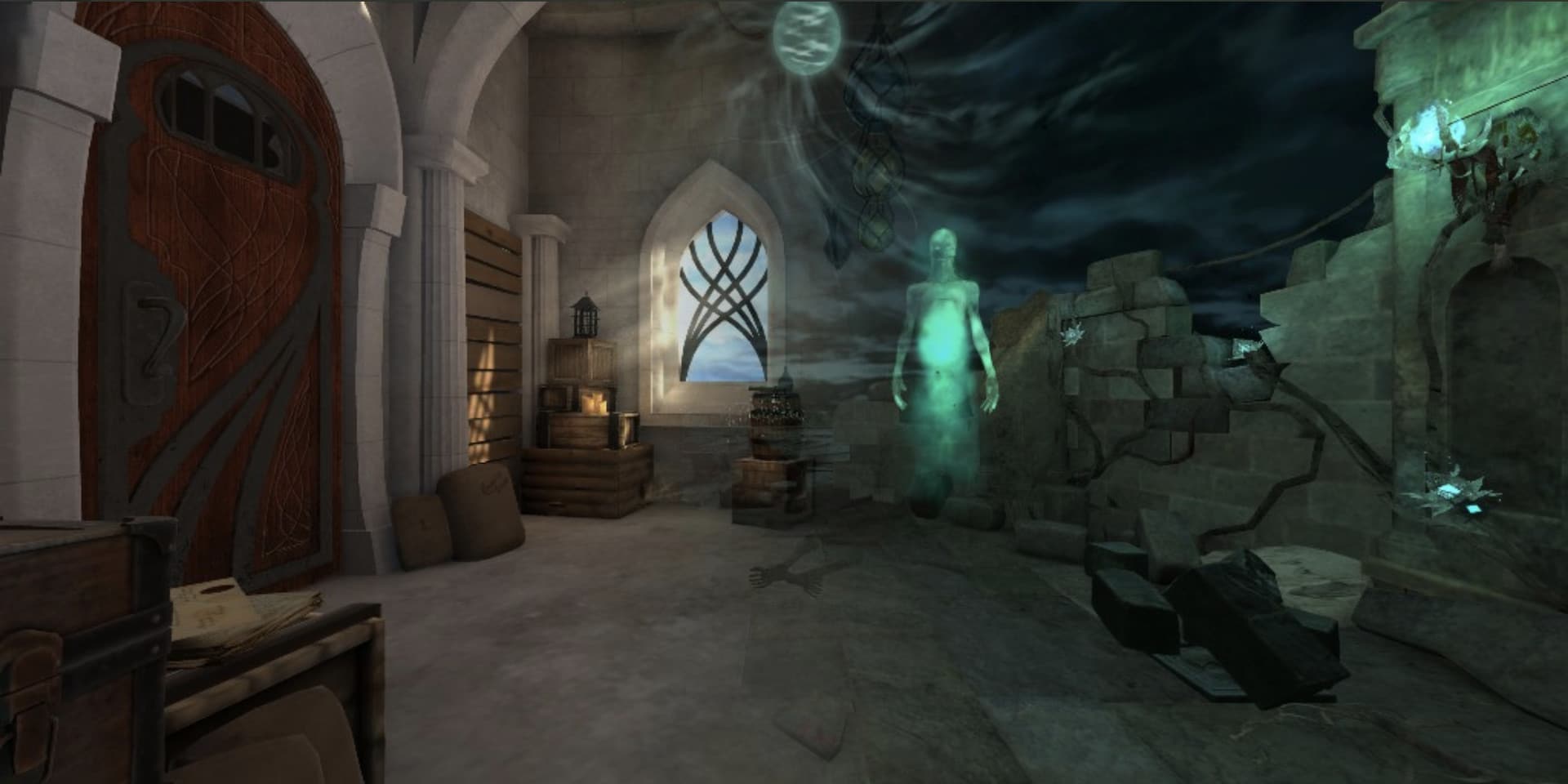In Flow Weaver you’re trapped in a magical prison and must escape using powerful dimension-hopping time-weaving magic. Check out our full Flow Weaver review below to see what we thought!
VR is a natural habitat for escape rooms, and it’s no big surprise that so many virtual escape rooms have appeared across the medium during a time when so many of us would like nothing more than to escape the room we’re actually in. Flow Weaver, a new VR escape room game from developers Stitch Media and Silverstring Media for the Quest and Rift/S, brings a touch of high fantasy to the VR escape room formula.
It does some interesting things with its use of multiple dimensions “overlaying” each other in the same space, but it ultimately falls flat, filling much of its time with generic exposition and constraining you to only a few static and claustrophobic areas across its 4-hour runtime.
[vc_row][vc_column][vc_cta h2=””]Flow Weaver Review – The Facts
What is it?: A magical VR escape room about time magic and dimension hopping
Platforms: Quest, PC VR coming this year
Release Date: March 11th, 2021
Price: $TBD[/vc_cta][/vc_column][/vc_row][vc_row][vc_column][vc_column_text]
The main mechanic here is called “flow weaving”, a school of magic that exists in Flow Weaver’s high fantasy-inspired world that lets you, the protagonist, shift between dimensions by pulling threads over from the other side. On the Oculus Quest 2, this effect is snappy. Given the minimal load times, it felt reminiscent of last year’s reveal trailer for Ratchet & Clank: Rift Apart, where Ratchet jumps between dimensions with little load time separating them all, making for a seamless experience. Traveling between dimensions in Flow Weaver certainly channels that same seamlessness, so it’s a shame that each environment is so limited once you get there.

Of the five total “rooms” you’ll visit, the puzzles are extremely short. In fact, there’s only an hour of content total, if you know what you’re doing. On the other hand, it took me about 4 hours to figure it all out – not because it was well-designed and captivating, but rather because things simply weren’t laid out all that well, and none of the clues led me in the right direction. It quickly became an exercise in trying everything over and over again until something clicked, and there were some spots that were upsettingly dense and frustrating for no obvious reason. One key example is a machine you have to power up by finding and reattaching lost gears. Finding the gears is simple, but since it’s not visually clear where those gears are meant to go, I spent an entire 30 minutes circling around until I eventually figured it out.
Adding on to Flow Weaver’s issue of time padding is the dialogue. There’s a lot of it, and none of it is skippable. Every time you enter a new room or unlock one of the 5 total runestones that are necessary for you to wrap things up, you’re immediately thrust into several lines of unskippable exposition that don’t really hold all that much emotional tension or weight, making Flow Weaver feel more drudgey than exciting and expansive. There’s just too little scope to what Flow Weaver is for any of its worldbuilding to feel particularly interesting.
You’re also not really able to interact that much with the world at all. By holding down the B button, you can highlight interactive objects in the environment. But there are two issues with this. One, not every interactive or important object is highlighted when you hold down B, making for some confusing situations like the one I mentioned earlier. Two, there aren’t many things you can toy with or interact with outside of the objects that are necessary for you to progress. Most of the world is static, which ultimately makes it uninteresting when compared to other games that give you more things to do with physics objects.

Luckily, the rooms are visually pleasing and nicely-detailed. The limited environments are at least quite varied, and each of them look great on the Oculus Quest 2. One room features a breathtaking ocean of clouds that contains mystical structures which swirl around you.
This is something that looks like it came right out of Warcraft’s Silvermoon City, but seems much grander in VR. Characters are less detailed, but they’re usually positioned so far away from you that it’s hard to notice. The soundtrack is easy to listen to in the background, and certainly doesn’t get in the way of the experience, but isn’t all that remarkable or memorable either.
[vc_row][vc_column][vc_cta h2=””]Flow Weaver Review – Comfort Settings
Flow Weaver is an entirely seated and forward-facing experience, which means that you can sit down on the couch and comfortably play the entire thing without ever getting up. That said, there are many moments where you’ll need to stretch your arms well out of your play area to grab distant objects and pull them towards you. The planar compass (the combined world map, spell menu, and journal, basically) is always positioned well above your head, making you need to crane your neck upward to interact with the different elements of it.
This makes me wonder whether Flow Weaver was always meant to be a seated experience. Other than that, you can use a “shadow hand” spell to pull distant objects toward you, kind of like the gravity gloves from Half-Life: Alyx, but with a little less flair and style.
[/vc_cta][/vc_column][/vc_row][vc_row][vc_column][vc_column_text]
Flow Weaver Review – Final Verdict
Flow Weaver is a sometimes entertaining, sometimes frustrating, and wholly forgettable break from reality which, by the end of its short but needlessly stretched-out hour of gameplay, left me ready to escape to some other game. If you love sorcery and you’re jonesing for a chance to cast a few spells in VR, there are certainly better alternatives like Waltz of the Wizard. However, the puzzles offered in Flow Weaver are still worth checking out if you absolutely love the escape room genre. If so, you’ll be rewarded with some genuinely nice looking environments that are easy on the senses.


For more on how we arrived at this score on our 5-star scale, read our review guidelines. This review was conducted using a digital pre-release version of the game on a Quest 2 headset.

You can check out the game on Oculus Quest if you’re interested. It’s also coming to Steam this year.



























